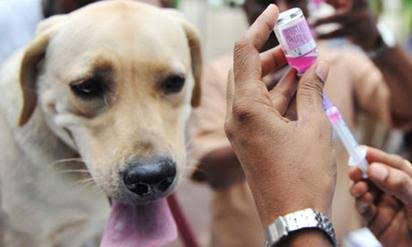The federal government has enjoined Nigerians to vaccinate their dogs in other to protect them and people around from rabies.
Nigeria’s Chief Veterinary Officer, Ositi Bakuru, made the call on Saturday in Abuja, during an awareness walk organized by the Federal Ministry of Agriculture and Food Security, in collaboration with Breakthrough Action Nigeria, and other partners, to commemorate World Rabies Day 2024.
The theme of this year’s commemoration is “Breaking rabies boundaries”
Bakuru, represented by Samuel Anzaku, the director , veterinary public health, Federal Ministry of Agriculture and Food Security, said people should be aware of the dangers of rabies, the need to take preventative measures and to also report cases of rabies to appropriate veterinary authorities.
‘Japa’ syndrome affecting Nigeria’s health sector, says Obasanjo
Minister urges regulatory law for fertility, reproductive health practice in Nigeria
He said the federal government would flag-off a nationwide mass vaccination of dogs across the the country towards reducing the incidence of rabies in the country.
He added that this aligns with the global goal of eliminating the disease as a public health threat by 2030.
He further said that the ministry has over the last two years, been collaborating with partners such as the Food and Agriculture Organization (FAO), World Health Organization ( WHO) , Breakthrough Action Nigeria, and others to develop a national strategic plan to eliminate rabies.
He said the plan outlines the steps needed to eradicate the disease in Nigeria, including mass vaccination of dogs and cats.
He said: “Starting on September 28th, a nationwide dog vaccination campaign will begin, and other activities will follow to further raise awareness.
“One of the key strategies for rabies control is ensuring responsible dog ownership, which includes registering dogs, vaccinating them, and keeping vaccination records. Dog owners are required by law to license their dogs and carry vaccination cards to ensure proper management in case of rabies exposure”.
Bakuru said rabies had become a serious problem globally and in Nigeria, adding that
human deaths have been reported in many states such as Gombe, Bauchi, Plateau, Cross River .
He said, “the public is often not aware of the danger of rabies until it is too late. Once the symptoms of rabies appear in humans, death is almost inevitable”.
The Director General of the Nigeria Centre for Disease Control and Prevention ( NCDC), Dr Jide Idris, who was represented by Nasir Ahmed said about 10,000 people are infected with rabies annually in Nigeria, adding that it highlights the urgency of the situation.
He said: “Collaboration across all sectors is essential to eliminate rabies by 2030.”
The focal point for rabies at the Federal Ministry of Health and Social Welfare,
Dorcas Mernyi, said that human rabies vaccines, procured by the Federal Ministry of Health, are distributed free of charge to affected states.
Mernyi said that however, because of high costs and a lack of local production, many rural residents are unaware of the availability of free vaccines.
She added that the ministry, in partnership with Breakthrough Action Nigeria, has launched a nationwide awareness campaign, through broadcasting jingles in multiple languages to educate the public on rabies prevention and treatment.
Usman Abdulrazak of the Federal Ministry of Environment stressed the importance of proper waste disposal in controlling stray dog population, noting that it contributes to the spread of rabies.

 Join Daily Trust WhatsApp Community For Quick Access To News and Happenings Around You.
Join Daily Trust WhatsApp Community For Quick Access To News and Happenings Around You.


